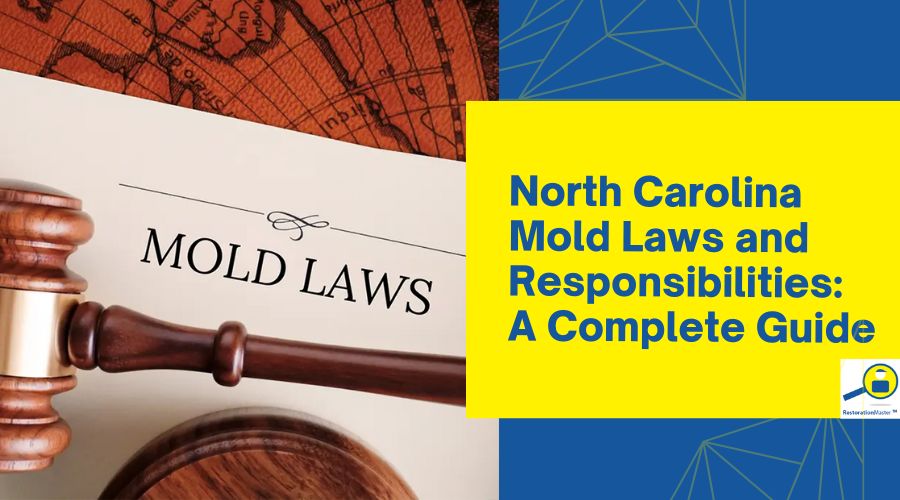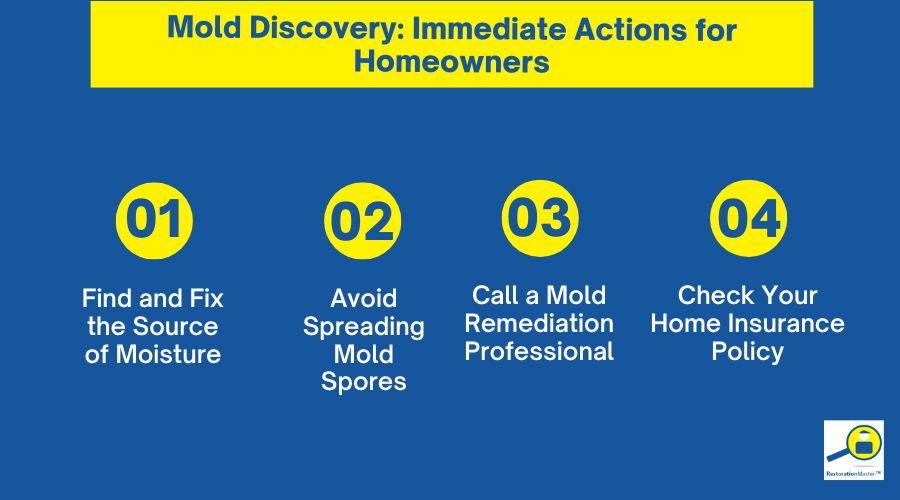
Mildew is a kind of points you by no means need to discover in your house—however in North Carolina, it’s a surprisingly widespread downside. Our humid summers, frequent rainstorms, and ageing housing infrastructure create the right circumstances for mould to develop quietly behind partitions, underneath flooring, and inside air ducts. And as soon as it begins, it doesn’t take lengthy for it to develop into a major problem—not only for the construction of your property, however to your well being and authorized duties as properly.
Whether or not you’re a house owner, tenant, landlord, or somebody on the brink of promote a property, it’s essential to grasp how mould is addressed underneath North Carolina regulation, what your rights are, and what your subsequent steps must be when you discover it.
Does Mildew Need to Be Disclosed in North Carolina?
For those who’re promoting a house in North Carolina, this is among the first questions which will come up: Do it’s important to disclose mould?
The quick reply: Sure—not directly.
North Carolina requires sellers to fill out a Residential Property Disclosure Assertion, a type that outlines recognized points with the house. The shape doesn’t have a checkbox labeled “Mildew,” nevertheless it does ask about water intrusion, drainage issues, plumbing points, roof leaks, and different circumstances that always result in mould. For those who’ve had mould up to now—or suspect there could also be a mould difficulty at the moment—you might be anticipated to reveal it, particularly if it stems from one in every of these listed issues.
What when you’re a landlord renting out a property? That’s slightly completely different. North Carolina doesn’t at the moment require landlords to reveal the presence of mould earlier than a tenant strikes in. Nevertheless, they’re obligated by regulation to maintain the property in liveable situation. Which means if mould develops because of one thing like a roof leak, leaking pipe, or poor air flow, and the owner doesn’t handle it, they may very well be violating state housing codes and tenant rights.
Backside line: Sellers ought to disclose something mold-related that may have an effect on the worth or livability of the house. Landlords ought to act quick when mould is reported and resolve the difficulty earlier than it worsens.
Who’s Liable for Mildew in a Rental?
With regards to mould in a rental property, the query of who’s accountable—landlord or tenant—is determined by two key issues: what triggered the mould and the way rapidly it’s reported and addressed.
Landlord Obligations
In North Carolina, landlords have a authorized obligation to maintain rental properties in good, livable situation. That features ensuring the house is structurally sound and free from circumstances that encourage mould progress.
Right here’s what landlords are anticipated to do:
- Preserve the property in secure, liveable situation by staying on prime of upkeep and repairs.
- Repair plumbing leaks, roof points, and HVAC issues as quickly as they’re reported.
- Tackle any indicators of water injury promptly to forestall mould from growing or spreading.
- Reply rapidly to tenant complaints about water points or mould.
If a landlord ignores the issue—and mould finally ends up making the house unsafe or impacting a tenant’s well being—tenants could have the fitting to:
- File a criticism with the native housing division
- Submit a written restore request and hold a paper path
- Request a hire discount or break their lease with out penalty
- Take authorized motion to get better damages
🛑 Vital: If the mould is a results of the owner’s failure to keep up the property, they could be held financially answerable for mould elimination, substitute of broken belongings, and even the tenant’s non permanent relocation if the property turns into unlivable.
Tenant Obligations
Tenants have duties too—primarily to take cheap steps to forestall mould and report issues earlier than they escalate.
Right here’s what tenants ought to do:
- Preserve the rental clear and well-ventilated, particularly in moisture-prone areas like bogs and kitchens.
- Use exhaust followers, open home windows when climate permits, and keep away from actions that add extra moisture (like drying garments indoors with out air flow).
- Report any leaks, water injury, or musty odors straight away. The earlier the owner is aware of, the earlier they’ll act.
- Get rid of trash correctly and hold moisture-sensitive areas dry—particularly round sinks, home windows, and basements.
If mould begins rising as a result of the tenant did not hold the place fairly clear or didn’t report water injury in time, the tenant could find yourself footing the invoice for cleanup and repairs.
What Qualifies as Uninhabitable Residing Circumstances in North Carolina?
Below North Carolina regulation, each tenant has the fitting to stay in a secure, livable house. Which means landlords are legally required to keep up sure minimal housing requirements. If these requirements aren’t met, the property could also be thought-about uninhabitable.
Listed below are some examples of what makes a residing house uninhabitable in NC:
- No working warmth, plumbing, or electrical energy
- Main structural points, like sagging flooring or a leaking roof
- Damaged home windows or doorways that permit pests or climate inside
- Infestations of rodents, roaches, or different pests
- Harmful mould progress, particularly when it’s widespread or causes well being issues
Mildew, particularly, falls right into a grey space. Somewhat little bit of floor mould in a toilet from poor cleansing habits won’t qualify. But when mould is rising behind drywall because of a leak the owner failed to repair—or if it’s affecting air high quality and making the tenant sick—it might very properly cross the road into uninhabitable territory.
Tenants who face these circumstances could have the authorized proper to:
- Request speedy repairs
- Withhold hire (if following the proper authorized course of)
- Terminate their lease
- Report the owner to code enforcement
For landlords, it’s greatest to not take possibilities. Mildew points left unchecked can rapidly result in authorized disputes—to not point out the well being dangers to your tenants and injury to your property’s construction.
What Ought to a Home-owner Do First When Mildew is Recognized?
Discovering mould in your house can really feel overwhelming. It typically reveals up while you least count on it—possibly you discover a musty odor after a storm, or uncover black patches rising behind your furnishings or close to your HVAC vents. Regardless of the way it’s found, the secret’s to behave rapidly and methodically.
Right here’s what you need to do straight away:
1. Discover and Repair the Supply of Moisture
Mildew wants moisture to develop. For those who solely clear up the mould with out fixing what triggered it, it’s assured to come back again. Test for:
- Leaky pipes behind partitions
- Roof injury after storms
- Cracks in your basis
- Poor air flow in bogs or basements
Even condensation from home windows or uninsulated pipes can create the type of damp setting mould loves.
2. Keep away from Spreading Mildew Spores
If the mould covers greater than a small space (greater than 10 sq. ft), don’t attempt to clear it your self. Disturbing it could launch spores into the air, spreading the contamination. Shut off the world if attainable, and switch off followers or HVAC methods that would flow into spores all through your property.
3. Name a Mildew Remediation Skilled
North Carolina doesn’t at the moment require state licensing for mould remediation specialists—however that doesn’t imply you need to rent simply anybody. Search for firms licensed by the IICRC (Institute of Inspection Cleansing and Restoration Certification) or those that comply with EPA tips for mould cleanup.
A certified mould skilled will:
- Establish the total extent of the issue (even behind partitions)
- Take away the mould safely utilizing correct containment strategies
- Dehumidify and dry the world fully
- Restore and restore the broken surfaces
4. Test Your Residence Insurance coverage Coverage
Householders insurance coverage could cowl mould if it’s brought on by a coated occasion, reminiscent of a burst pipe or water injury from a storm. Nevertheless, if the mould is because of long-term neglect (like ignoring a gradual leak), it in all probability received’t be coated. Name your insurance coverage supplier straight away and doc every thing—images, notes, inspection stories, and receipts for repairs.

Need assistance with mould remediation in Charlotte or Gastonia, NC?
Whether or not you’re managing a rental in Gastonia, sustaining a property in Charlotte, or getting ready to checklist your property elsewhere in North Carolina, understanding your authorized obligations in terms of mould can prevent time, cash, and pointless stress. Staying knowledgeable places you in management—permitting you to take the fitting steps earlier than a small difficulty turns into a a lot greater downside.
For those who’ve observed mould in your house or rental property, don’t look ahead to it to unfold or trigger injury to your well being or belongings. Mildew thrives in moisture-rich environments, and with out correct intervention, it could compromise each the construction of your property and the wellbeing of these residing inside. The very best plan of action? Herald a licensed mould remediation skilled who can examine the affected areas, determine the supply of the issue, and take away the mould safely and completely.
At RestorationMaster, we associate with owners, landlords, and actual property professionals throughout Gastonia, Charlotte, and surrounding areas to ship dependable mould inspections, professional remediation, and full restoration providers. Our skilled crews use industry-standard strategies and superior tools that can assist you return your property to a clear and wholesome situation.
Attain out at present to schedule your inspection—and take step one towards resolving your mould considerations with confidence.


